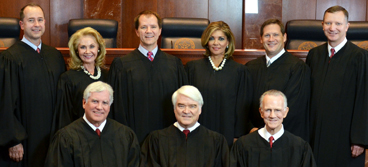© 2017 The Texas Lawbook.
By Allen Pusey
(March 17) – The Supreme Court of Texas Friday allowed a defamation suit against D Magazine to proceed while rejecting an appeals court’s use of Wikipedia to reach the same decision.
The lawsuit involved an anonymously written article in the Dallas-based magazine titled “The Park Cities Welfare Queen” concerning a woman living in a $1.15 million home in University Park who had been receiving food stamps. The woman, Janay Rosenthal, was described as a Park Cities mom who “has figured out how to get food stamps while living in the lap of luxury.” Ms. Rosenthal has objected to the depiction as both inaccurate and defamatory.

The case had been closely watched by media organizations concerned with the reliance of a lower court on Wikipedia, the crowd-sourced online encyclopedia. A friend of the court brief was jointly filed by the Freedom of Information Foundation of Texas, the Reporters Committee for Freedom of the Press, Texas Association of Broadcasters and the Texas Press Association.
The magazine sought dismissal of her lawsuit under the Texas Citizens Participation Act, an anti-SLAPP statute designed to protect public speech against unfounded lawsuits. And while the trial judge dismissed statutory elements of the suit, the high court held that Ms. Rosenthal’s defamation claim met the standards required under the TCPA.
“Texas and federal law recognize the importance of protecting free speech, particularly on matters of public concern,” wrote Justice Debra H. Lehrmann for the court. “Still, publications can and do cross the line from protected free speech to actionable defamation. Here, Rosenthal presented clear and specific evidence sufficient to support a prima facie case of defamation.”
The Dallas Court of Appeals had declared a similar opinion, but in its analysis, had relied on a definition of the term “Welfare Queen” obtained from Wikipedia. The court noted that while Wikipedia could be a useful and timely source of information about slang and pop culture, its use is problematic in the context of a legal opinion. In particular, Justice Lehrmann noted, the Dallas appeals court had made the Wikipedia definition of “Welfare Queen” the core of its analysis of the elements of defamation.
That reliance was unnecessary, Justice Lehrmann wrote. In arguing for dismissal, D Magazine maintained that the article had not been about Ms. Rosenthal, but about the failure of the Texas Health and Human Services Commission to screen out applicants, like Ms. Rosenthal, whose public record suggested both adequate personal assets and a criminal record.
The court disagreed. The article, the justices concluded, suggested to a reasonable person that Ms. Rosenthal had committed a crime. The article, they noted, was displayed in a section called “CRIME,” with a mugshot from an unrelated matter. Although the article said “we can’t be sure” what Rosenthal reported to the commission, “public records indicate that [she] must have been less than forthcoming” in what she reported.
Following publication of the article, the commission’s general counsel sent a letter to the magazine requesting that personal information contained in the article, which they believed had been obtained by deception, be removed from the online version of the article. Moreover, after publication, Ms. Rosenthal asked the commission whether she had committed any wrongdoing in obtaining her benefits, and received a letter saying the matter had been investigated and that she had not.
John E. DeFeo, who represents Ms. Rosenthal, was unavailable for comment.
“In sum, we agree with the court of appeals that Rosenthal presented evidence that D Magazine failed to take reasonable steps to verify the accuracy of the story’s gist and should have known the gist was false.”
While the court remanded the case to the trial court, the ruling returns an issue of attorney fees to the court as well. In dismissing several statutory claims under the TCPA, the court refused a claim of attorney fees on behalf of D Magazine. The Supreme Court said that was an error. Though the whole suit was not dismissed, the Supreme Court ruled that the TCPA requires that attorney fees be paid for those elements of the lawsuit that did not survive.
“Needless to say, we’re gratified at that portion of the decision regarding attorney fees,” said Jason Bloom, a partner at Haynes & Boone, who represented the petitioners. “But we were hoping that the whole case would end.” Bloom said that D Magazine and the other related defendants are weighing their options, including a rehearing.
“That said, particularly in the case of the reliance on Wikipedia, I think the court got it mostly right.”
To make sure that the point about Wikipedia was made, Justice Eva Guzman emphasized her own objections in her own concurrence.
“In an age when news about ‘fake news’ has become commonplace, long-standing concerns about the validity of information obtained from ‘consensus websites’ like Wikipedia are not merely the antiquated musings of luddites. To the contrary, as current events punctuate with clarity, courts must remain vigilant in guarding against undue reliance on sources of dubious reliability. A collaborative encyclopedia that may be anonymously and continuously edited undoubtedly fits the bill.”
The case: D Magazine Partners, L.P. et al v. Janay Bender Rosenthal (No. 15-0790)
The court was generally right on the Wikipedia front.
© 2017 The Texas Lawbook. Content of The Texas Lawbook is controlled and protected by specific licensing agreements with our subscribers and under federal copyright laws. Any distribution of this content without the consent of The Texas Lawbook is prohibited.
If you see any inaccuracy in any article in The Texas Lawbook, please contact us. Our goal is content that is 100% true and accurate. Thank you.
